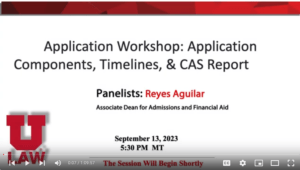JD PROGRAM
The JD Program at Utah Law
The University of Utah's S.J. Quinney College of Law provides you with unmatched opportunities to study and engage in the law.
Contact our JD admissions team at admissions@law.utah.edu or (801) 581-7479.



Important Dates and Deadlines
2024-2025
The October 2024 LSAT is the last exam considered for Early Decision.
Learn more about the Early Decision Program
The committee begins reviewing Regular Decision applications in early November. After the committee begins reviewing files (on November 1), decisions are generally made six (6) to eight (8) weeks after the date the applicant completes and submits the application.
NOTE: If an applicant completes and submits their application before the admission committee begins reviewing applications, a decision on the application will not be made until six (6) to eight (8) weeks after November 1.
First-round merit-on-entrance scholarship evaluations begin with this candidate group.
The November 2024 LSAT is the last exam considered for the priority consideration application deadline.
The February 2025 LSAT is the last exam considered for the final application deadline.
*The Early Decision application program is binding; thus, if you apply, and you are subsequently admitted, you commit to enrolling at and attending the University of Utah S.J. Quinney College of Law. If you submit your completed Early Decision application by October 25, you will be notified of your application status on or by November 15.
**Completed applications received after the final deadline will be reviewed if seats remain available.
Applicants must register for the Credential Assembly Service (CAS). It is the applicant’s responsibility to ensure that transcripts from each U.S. college or university ever attended are sent to the CAS, regardless of credits being transferred or applied toward degree requirements. If an applicant is seeking readmission, they must submit a new CAS report. Once the CAS file is complete, applicants should allow four (4) to six (6) weeks for the S.J. Quinney College of Law to receive and process the CAS report.
A complete CAS Report includes:
- CAS Banner/Summary Page (produced by CAS when the applicant requests the CAS Report)
- Official Transcripts
- LSAT Score(s)
- LSAT Writing Sample
- Letter(s) of Recommendation
You may apply before you receive your undergraduate degree. However, before you matriculate, you must provide official transcripts showing that you have been awarded a baccalaureate degree from a college or university whose accreditation is recognized by the U.S. Department of Education or be the foreign equivalent of a U.S. baccalaureate degree.
All candidates must take the LSAT. LSAT scores that are older than five years will not be accepted for candidates seeking admission. For example, applicants submitting and application during the 2024-2025 application cycle must have a score no older than the September 2019.
LSAT Exemption
The College of Law, under ABA Standard 503, may admit a limited number of students who have not taken the LSAT. Those applicants must meet certain conditions to be eligible to apply. Information on the College of Law's LSAT exemption policy can be found on the Admissions FAQs page.
You are required to have one (1) but may have up to three (3) letters of recommendation submitted on your behalf. Letters of recommendation should come from people who know you well and have had the opportunity to observe you, preferably, in an academic or professional setting. Letters must be submitted through the LSAC Letter of Recommendation Service. To use this service, follow the instructions outlined on LSAC's "Letters of Recommendation" webpage.
The statement(s) you are submitting as part of your application are viewed as a document(s) demonstrating your writing ability. As noted in the application certification, you may use generative Artificial Intelligence (AI) in drafting the content of your statements. If you elect to use AI in drafting the content of your statements, you must disclose this and acknowledge the statements in which you used AI. The statements must be written in the following format: one (1) inch margins, double spaced, and a font size no smaller the 10-pt. The statement length limits are indicated in the prompts for each statement.
Candidates are required to submit a personal statement of no more than (2) two pages in length. The Admission Committee's goal is to assemble an intellectually stimulating community of students composed of individuals who have varied backgrounds and perspectives. In addition to outstanding academic ability, we seek students whose life experiences, backgrounds, and interests will enhance our educational community. This includes, but is not limited to, qualities such as leadership, maturity, organization, knowledge of other languages and cultures, sincere commitment to community service, a history of overcoming disadvantage, extraordinary accomplishment, or success in a previous career. The subject matter of your personal statement is up to you. The personal statement should let the Admission Committee know more about you as a person and should address the above qualities if that information is not presented in other areas of your application. Issues addressed in your personal statement may include the background, experiences, and events (positive or negative) that have affected you. You may address the perspectives and experiences you will bring to classroom discussions and the law school community or your motivations for seeking a legal education.
The S.J. Quinney College of Law requires that your foreign transcripts be submitted through the Credential Assembly Service. If you completed any postsecondary academic work outside the U.S. (including its territories) or Canada, you must use this service for the evaluation of your foreign transcripts. The one exception to this requirement is if you completed the foreign work through a study-abroad, consortium, or exchange program sponsored by a U.S. or Canadian institution, and the work is clearly indicated as such on the home campus transcript. This service is included in the Credential Assembly Service registration fee. An International Credential Evaluation will be completed by the American Association of Collegiate Registrars and Admissions Officers (AACRAO), and will be incorporated into your Credential Assembly Service Law School Report. To use the Credential Assembly Service for your international documents, follow the online instructions for registering for the service. Be sure to print out a Transcript Request Form for each institution and send it promptly to them. More time is usually required to receive foreign transcripts. Questions about foreign transcripts and the Credential Assembly Service can be directed to LSAC at 215.968.1001 or LSACinfo@LSAC.org.
Applicants whose native language is not English must submit official results from the TOEFL or IELTS tests and the test needs to have been administered in the last 12 months from application. You are not required to submit a TOEFL or IELTS score if you have received a baccalaureate or graduate degree from an accredited U.S. college or university.
TOEFL
If you sat for the TOEFL, you must contact the Educational Testing Service (ETS) and request that your TOEFL score be sent to LSAC to be incorporated into your Credential Assembly Service Law School Report. LSAC’s TOEFL code for the Credential Assembly Service is 8395.
IELTS
If you sat for the IELTS, you must contact your IELTS testing center and request that your IELTS score is sent to LSAC to be incorporated into your Credential Assembly Service Law School Report.
- Addendum
- Life Perspective Statement
- Leadership Statement
*Files will be processed if a valid LSAT score and LSAT writing sample are on file unless the candidate requests a hold on review.
Admission Factors
When we assess applicants for admissions, academic aptitude is not the only factor considered. Below is a list of criteria to keep in mind:
- LSAT score(s)
- Undergraduate GPA
- Advanced work, other degrees
- Major
- Difficulty of college course work
- Grade trends
- Dominant language or other language skills
- Quality of high school and prior academic experience
- Family education history
- Other test scores
- Hours worked and other responsibilities during school
- Age (Life experience)
- Geographic residence
- Socioeconomic status, family size
- Multicultural experiences
- Growing up in a low-income community
- Law related experience or knowledge
- Military status
- Work experience
- Position
- Level of responsibility achieved
- Full time, part time
- Number of years worked
- Type of industry or business
- Follow-through ability
- Undergraduate or graduate leadership activities
- Community leadership/accomplishments
- Volunteer activities
- Academic leadership and organizations
- Civic engagement
- Athletic activities
- Travel, foreign living
- Service activities
- Special skills and talents
- Music, drama, writing, artistic
Contact Us







